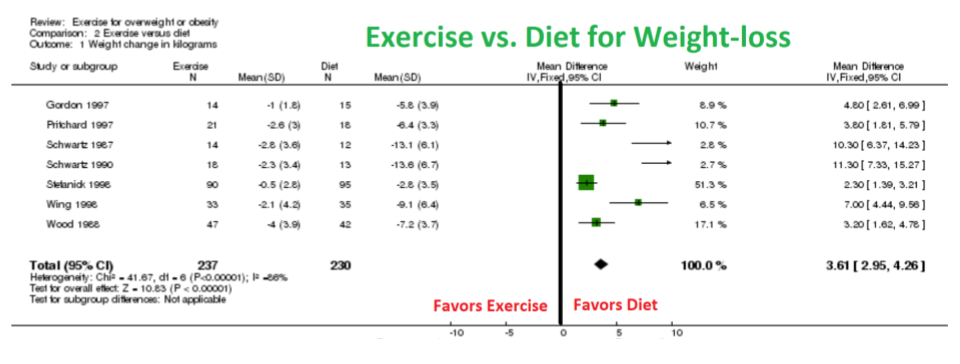What is the best exercise for weight-loss? I have no doubt that if you have ever tried losing weight or becoming healthier, you have probably typed something similar into Google to find an article. Or, perhaps you thought about it once and suddenly ads for it started popping up on your Facebook news feed.
And we have all wondered: what is the best exercise or gym routine that will finally give us the body we want? It is a common topic with my clients and often involves a series of ‘If/Then’ statements –
‘If I could just find a way to exercise more, THEN I could lose weight.’
‘If I weren’t injured, THEN I would be able to exercise and lose weight.’
You get what I am saying.
What does exercise really do for weight loss?
The reality, though, is that exercise really doesn’t do much for weight loss or at least as much as it seems like it should be based on effort, perspiration, soreness, and how bright the light appears as you feel yourself passing into the after-life while completing your 26th burpee.
In fact, a lovely Cochrane Database Review showed that exercise alone would lead to a weight loss of ~0.5-4.0kg, which is modest at best. Compared to a group that focused on creating a calorie deficit alone, the patients that were in the diet group lost substantially more weight ~2.8-13.6kg.
As an aside, burpees are one of the most overrated and useless exercises ever. Walking is one of the most underrated and best exercises ever, just an FYI in case someone says you NEED to do burpees. This is just one of my many Dan-isms.
To just hammer home my point, look at the figure below (adapted from the Cochrane Database review I mentioned above) comparing exercise alone vs. dietary changes alone. As you can see, all the little squares are on the right side of ‘0’. You can think of ‘0’ like Sweden; it’s neutral. However, unlike Sweden, ‘0’ does not produce meatballs or divorce due to terrible furniture assembly. Whichever side the green and black squares fall on means that intervention is favoured. In this case, diet is favoured as more effective for weight-loss!

OK, BUT if we are creating a calorie deficit with exercise, why does it not lead to weight-loss?!
Well, there are a couple of ideas:
- Exercise and activity make up only a small fraction of our total calorie burn throughout the day. Most of our calories are burned just to keep the proverbial lights of our body on and functioning properly. Which you essentially have no control over. Worse yet, your body might undergo metabolic changes to reduce energy expenditure after exercise. We can all thank evolution for that, a*shole.
- People tend to increase their food intake following exercise. Partly because you are hungrier, duh, but sometimes without realizing it, people will overestimate the amount burned or will ‘reward’ oneself because they worked out. ‘Yay me. I deserve a large pizza instead of a small.’ I have run into this problem more than once.
- You slow down or become lazier after working out. Walking up to my fourth-floor condo? That sounds like an awful idea on the days I work out, especially after leg day. I need to conserve whatever strength I have left to stand up from the toilet, let alone take the stairs.
Great, so exercise sucks for weight-loss! Why should we even bother then?!
Good question. The reason is we shouldn’t be exercising or increasing our activity for the purpose of weight-loss. We should do it because it does incredible things for our health. No seriously!? Many chronic diseases such as high blood pressure, blood sugars, and lipids improve with exercise alone! We have come a long way in terms of medicine and the number of Dr. Google experts in the world; however, no treatment, medication, or surgery can provide the health benefits that exercise does. Not only that, while exercise is not great for weight-loss it has a huge role in weight maintenance.
Regular activity can help manage and prevent just about every chronic disease known to man — everything from improving your heart health to your mental well-being to enhancing your sex drive. And, the more you can do, the better! The minimum amount of recommended activity is ~30 mins/day or 150 mins/week. However, patients from the National Weight Control Registry (NWCR), these are people who have lost at least 30lbs and have kept the weight off long term, are generally engaging in at least 60 mins of physical activity each day! So 30 mins are great, but if you can work your way to 60 minutes or more, the health benefits continue to multiple. One of my stipulations with my clients is they must work towards increasing their activity levels. We never start with a full gym session; it might be a matter of starting by putting your shoes on and taking your shoes off. Or, going for a short walk. Or, going out in your yard and gardening. The possibilities are endless. The key is just to START, be consistent, and watch your life transform.
How are you going to become more active? Till next time my friends.
– Dr. Dan
Reference:






